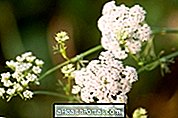Mutamba, also known as the black-headed mutamba, black-headed, male-headed, perikiteira, chico-emaci, envireira or cockroach, is a common medicinal plant in Brazil and Mexico, which is used in the treatment of dysentery, diarrhea, gastrointestinal problems or pains, and hair loss.
The scientific name of this plant is Guazuma ulmifolia and its leaves, barks and dried roots can be used in the preparation of teas, tinctures or concentrated extracts.

What is Mutamba for?
This medicinal plant helps in the treatment of diverse problems like:
- It helps in the treatment of dysentery and diarrhea;
- Treats problems related to the prostate, kidneys or liver;
- Facilitates childbirth;
- Relieves gastrointestinal pain;
- Helps reduce fever;
- Acts as healing of wounds and ulcers;
- Helps complement the treatment of syphilis;
- It helps in the treatment of respiratory problems such as asthma, bronchitis or pneumonia.
The dyes prepared with this plant can also be used in the treatment of dermatoses or other skin problems, due to the cicatrizant properties of this plant. In addition, your oil can also be used to prevent or stop hair loss.
Properties of Mutamba
In general, the properties of Mutamba include a healing effect on the skin and mucous membranes, depurative and purgative, healing, antiseptic, which induces perspiration and helps to clear the liver.
Mode of Use
Mutamba leaves, husks and dried roots are generally used to prepare homemade teas, and concentrated extracts of the plant may be found on the market.
Mutamba tea for dysentery and diarrhea
The tea of this plant can be easily prepared using dried barks from the plant stem, as follows:
- Ingredients: 2 to 3 tablespoons of dried leaves or peels of Mutamba;
- How to prepare: put the dried peels of the plant in a pan with 1 liter of boiling water, letting the mixture boil for 10 minutes over medium heat. After that time, turn off the heat, cover and let stand for 10 to 15 minutes. Coar before drinking.
This tea should be drunk 2 to 3 times a day, according to need and sensed symptoms.
There is also available in the market the concentrated extract of this plant, which can be taken daily, replacing the use of tea. The recommended doses should be indicated by the manufacturer and it is generally recommended to take 30 drops diluted in water three times a day.
Side effects
This plant when consumed in large quantity, or without medical supervision, can cause some unpleasant side effects, which may include nausea; vomiting and dysentery.
Mutamba can also be consumed by children, provided they are under the guidance of the pediatrician.



























